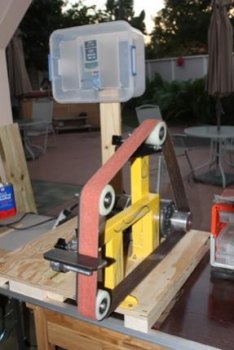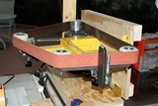My thoughts sorta mimic Dougs here.
The belt grinder will be the FOUNDATION of your entire knifemaking endeavor. It'll get used for EVERYTHING ! Especially when your a beginner and lack some of the more specialized tools.
There are generally two trains of though for how a newbie should approach tool choices-
1. Start with beginner equipment thats inexpensive to get your feet wet and see if Knifemaking is REALLY for you. This is very good advice for specific types of folks. Those folks would be- 1. Those not experienced with power tools and handwork previously. 2. Those who have a low tolerance for getting dirty, burnt, and/or cut. 3. Those who are just naturally flighty individuals who may be apt to just change their mind about their hobby in a year and decide to take up oragami or growing bonzai trees. 4. Those who have the inability or no desire to spend money on their hobby in the future.
2. Many folks interested in making knives are the opposite of the type mentioned above and these types seem natuarally drawn towards the craft. These types know from previous experience the value of quality tools and the commitment it takes to master their use. They will also generally learn quickly and find great satisfaction in the craft.
For these folks the advice is simple. Get best possible tools you can, learn to use them and never look back.
Back to the belt grinder. Your budget is a little light for a top tier machine but if your a type 2 person keep saving and go for a quality machine from the start. You'll never regret it and the often stated saying is true - Buy Once Cry Once.
There are a number of great machines out there today so choosing a belt grinder can be a duanting task not only for a newbie but for experienced makers alike.
-As a side note, Id recommend putting off spending money on schooling/travel etc and add those funds to your grinder fund and choose your machine based on it's features and quality as opposed to price. Doing this will get you started on the right foot. Hang around a bit and you'll find not only is it amazing what you can learn online but you'll most likely find someone who'll help you out in person as you learn. Attending school with a little experience under your belt will assist you in taking full advantage of the teaching.
I'd recommend avoiding the middle of the road machines. Too expensive for something you'll quickly wish to upgrade. Either go top tier or go for a truely inexpensive machine.
IMHO without doing a ton of research I think 2K will get you into a top tier machine and 3K would open you to all options.
Make the descision to spend the $$$ on the belt grinder and then start really looking at options and features.
-Josh


